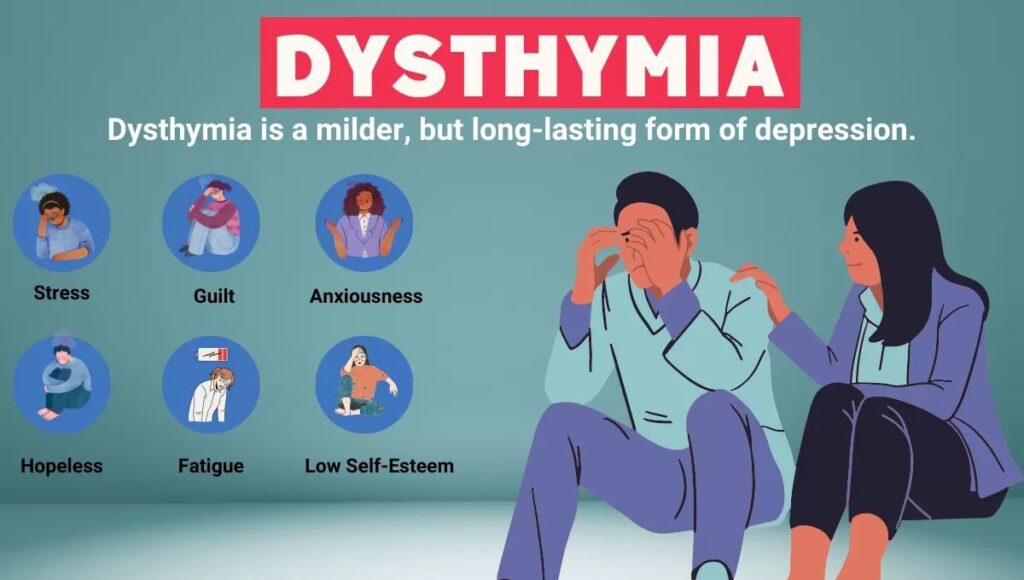Understanding Dysthymic Disorder: A Chronic but Treatable Mood Disorder
Dysthymic disorder, also known as dysthymia, is a type of chronic mood disorder that affects millions of people worldwide. It is characterized by a low-grade, persistent depression that lasts for two years or more, along with one or more episodes of major depression. In this article, we will delve into the causes, symptoms, and treatment options for dysthymic disorder, helping to raise awareness and understanding of this often-misunderstood condition.
What is Dysthymic Disorder?
Dysthymic disorder is a chronic mood disorder that is characterized by a mild, persistent depression. It is often described as a “low-grade” depression, as the symptoms are not as severe as those experienced in major depression. However, the symptoms can still have a significant impact on a person’s daily life, relationships, and overall well-being.
Causes of Dysthymic Disorder
The exact causes of dysthymic disorder are not fully understood, but research suggests that it may be linked to a combination of genetic, environmental, and psychological factors. Some potential triggers include:
– Family history: Individuals with a family history of depression or dysthymic disorder may be more likely to develop the condition.
– Stress: Chronic stress can contribute to the development of dysthymic disorder.
– Trauma: Traumatic events, such as the loss of a loved one or a physical or emotional abuse, can increase the risk of developing dysthymic disorder.
– Personality traits: Certain personality traits, such as being overly critical or perfectionistic, may increase the risk of developing dysthymic disorder.
Symptoms of Dysthymic Disorder
The symptoms of dysthymic disorder can vary from person to person, but common symptoms include:
– Persistent feelings of sadness or emptiness
– Loss of interest in activities that were once enjoyed
– Changes in appetite or sleep patterns
– Difficulty concentrating or making decisions
– Fatigue or lack of energy
– Irritability or mood swings
– Difficulty with self-esteem or self-worth
Treatment Options for Dysthymic Disorder
Fortunately, dysthymic disorder is treatable with a combination of psychotherapy and medication. The most effective treatment options include:
– Antidepressant medication: Selective serotonin reuptake inhibitors (SSRIs) are commonly used to treat dysthymic disorder.
– Psychotherapy: Cognitive-behavioural therapy (CBT) and interpersonal therapy (IPT) are two effective forms of psychotherapy for treating dysthymic disorder.
– Lifestyle changes: Engaging in regular exercise, practicing relaxation techniques such as meditation or yoga, and getting enough sleep can help alleviate symptoms.
Living with Dysthymic Disorder
Living with dysthymic disorder can be challenging, but it is not impossible. With the right treatment and support, individuals can manage their symptoms and improve their overall well-being. It is essential to seek professional help if you are experiencing symptoms of dysthymic disorder.
Conclusion
Dysthymic disorder is a chronic mood disorder that affects millions of people worldwide. While it can be a challenging condition to manage, it is not impossible to treat. By understanding the causes and symptoms of dysthymic disorder, and seeking professional help when needed, individuals can take control of their mental health and live fulfilling lives.
References:
https://www.hopkinsmedicine.org/health/conditions-and-diseases/dysthymia
https://www.ncbi.nlm.nih.gov/books/NBK559078/
https://my.clevelandclinic.org/health/diseases/9292-persistent-depressive-disorder-pdd
Websites:
Britmed Healthcare: https://britmedhealthcare.co.uk/
Nightingale Hospital: https://www.nightingalehospital.co.uk/
Top Doctors: https://www.topdoctors.co.uk/doctor/ahmed-el-missiry
You can also book, Contact us on WhatsApp 08009708017




